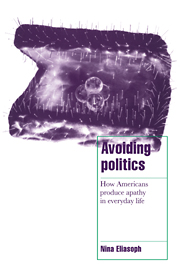Book contents
- Frontmatter
- Contents
- Acknowledgments
- 1 The mysterious shrinking circle of concern
- 2 Volunteers trying to make sense of the world
- 3 “Close to home” and “for the children”: trying really hard not to care
- 4 Humor, nostalgia, and commercial culture in the postmodern public sphere
- 5 Creating ignorance and memorizing facts: how Buffaloes understood politics
- 6 Strenuous disengagement and cynical chic solidarity
- 7 Activists carving out a place in the public sphere for discussion
- 8 Newspapers in the cycle of political evaporation
- 9 The evaporation of politics in the US public sphere
- Appendix 1 Class in the public sphere
- Appendix 2 Method
- Notes
- References
- Index
- Titles in the serious
8 - Newspapers in the cycle of political evaporation
Published online by Cambridge University Press: 17 November 2009
- Frontmatter
- Contents
- Acknowledgments
- 1 The mysterious shrinking circle of concern
- 2 Volunteers trying to make sense of the world
- 3 “Close to home” and “for the children”: trying really hard not to care
- 4 Humor, nostalgia, and commercial culture in the postmodern public sphere
- 5 Creating ignorance and memorizing facts: how Buffaloes understood politics
- 6 Strenuous disengagement and cynical chic solidarity
- 7 Activists carving out a place in the public sphere for discussion
- 8 Newspapers in the cycle of political evaporation
- 9 The evaporation of politics in the US public sphere
- Appendix 1 Class in the public sphere
- Appendix 2 Method
- Notes
- References
- Index
- Titles in the serious
Summary
Reading the local newspapers in Amargo and Evergreen City did not help citizens make connections between politics and everyday life, did not help them learn about the art of political debate, and inadvertently discouraged them from speaking out in a public-spirited way. Far from the sober gray world of national news, the world of local news is simultaneously lurid and down-home. The news in local Amargo and Evergreen papers was a rushing stream of unpredictable, curious, and scary events that happen to other people, usually elsewhere – lost children in other states, Siamese twins some-where who ride a bicycle built for two, freak poisonings, the random, and the weird – and advice about cholesterol, dogs, yard care, consumer advice on brands of cough drops and local shopping. That is, the local papers were mainly tabloids with tamer headlines (Bird 1990) plus consumer gazettes.
Still, they did cover many local events, using serious local reporters, and they devoted two pages per issue to national and international news. And they were most people's source of news, aside from TV – everybody I met who read newspapers read either the Amargo Herald or the Evergreen Country Times. Every now and then, a few activists and cynics read nearby city newspapers, but those papers rarely had news about suburbs. No one read national newspapers such as The New York Times, Washington Post, or Los Angeles Times.
- Type
- Chapter
- Information
- Avoiding PoliticsHow Americans Produce Apathy in Everyday Life, pp. 210 - 229Publisher: Cambridge University PressPrint publication year: 1998



